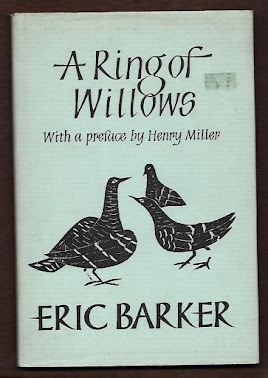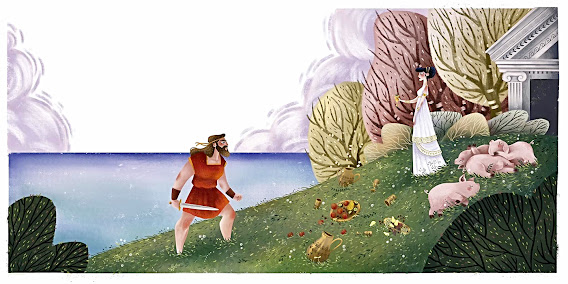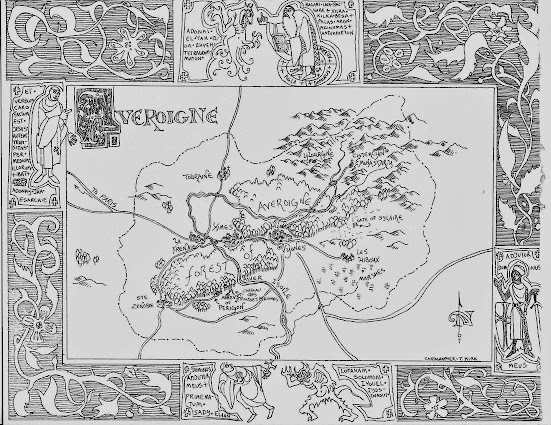Monday, January 31, 2022
Melancholia
Sunday, January 30, 2022
A diversion: the poetry of Eric Barker
Clark Ashton Smith (CAS) was good friends with the poet Eric Wilson Barker and his wife, the dancer Madelynne Greene. In a blog post from a few years ago, I considered some criticism of CAS' poetic practice that Barker made in a commemorative essay on his relationship with The Bard of Auburn:
https://www.desertdweller.net/2018/08/a-diversion-eric-barker-on-poetry.html
More recently, I've been reading CAS' correspondence with the poet Samuel Loveman, and came across these thoughts penned by CAS*:
I believe you will find the Barkers very congenial; they, like you and I, are pagans haunted by the nostalgia of antique beauty. I owe them many of my happiest days, and have found something of the Golden Age in their company.
Eric is a true poet, especially in his feeling for the more inward and mystic springs of nature.
As it happens, I just finished reading a book of Barker's poems published in 1961 (the same year that CAS died). A Ring of Willows seems to have been Barker's best-known collection of verse, and having read it, I can't equal CAS' enthusiasm. Of course, CAS' statement above really refers only to the poet and not the poetry itself, but the latter is all I have to evaluate.
Overall, the poems in A Ring of Willows represent modernist poetry at it very dullest, with practically no music at all in the language, and rather mundane takes on subjects focused on landscapes and wild creatures. The one poem in this collection that really works is "The Deserted", a description of an abandoned house which manages to achieve some real poetic effects in its final stanza:
who must have chosen such a cloud-loved hill
for what to them was seeming permanence.
And what ill circumstances had tripped them up,
and set against the walls those smoldering fires
that eat a house to death with shameless wounds.
As I noted in my blog post from August 2018 (linked above), Barker's own evaluation of CAS' poetry seemed to miss the mark in citing "picturesque and archaic language" as the source of "his weakness as a contemporary poet." In that same essay, Barker further noted that "it is the poets who change the language and so save it from sterility." There is no evidence at all of Barker himself trying to take on that challenge in the verses included in A Ring of Willows.
Interestingly, the prominent twentieth century American poet William Dickey reviewed A Ring of Willows in the November 1961 issue of Poetry magazine, and seems to have arrived at much the same conclusion as I have:
This poetry is often based on descriptions of nature, descriptions which in their simplicity of diction edge over toward (Robert) Frost. But there is not much of Frost's economy - Barker cannot resist persistent double phrases - and there is almost nothing of Frost's bite.
My intention in this post is not to try and raise CAS up by knocking Eric Barker down, but rather to reflect on CAS' lack of inclination to follow trends in poetry that were dominant in his lifetime, and how Barker seems to have made the opposite decision. Several decades on, it seems quite clear to me that CAS' efforts led to the creation of a body of work that has some truly timeless qualities, while Barker's own verses failed to transcend the modernist idiom that he employed, and thus have been almost entirely forgotten.
*See letter #365 in Born Under Saturn: The Letters of Samuel Loveman and Clark Ashton Smith published by Hippocampus Press.
Friday, January 28, 2022
Lethe
This is another poem from Clark Ashton Smith (CAS) that was unpublished in his lifetime, and is not available on The Eldritch Dark, so here's the complete text:
for him that lingers at the wharf of Lethe,
CAS also created a Spanish version of this same poem with the title "Leteo".
It's interesting to note that in my chronological journey through CAS' poetry, this is the fourth poem named "Lethe" that I've read. You can click the link of the same name below to see my comments on the other three works that share the same name.
Of course, CAS wrote many poems that reference the river Lethe, but it's interesting to take a smaller focus and examine only those to which he assigned the same title.
This particular poem seems to me the most impressive of that particular group of verses, for while the waters of the river of oblivion beckon, the subject of the poem "lingers at the wharf of Lethe", suggesting a hesitation to slip beneath those soothing waters. And yet it seems that he does go forward and release himself to the riverine flow.
This version of "Lethe" is short but poignant, and leaves room for interpretation. That's one definition of great literature, as articulated by the late writer Gene Wolfe (himself an admirer of CAS):
My definition of good literature is that which can be read by an educated reader, and reread with increased pleasure.
Wednesday, January 26, 2022
The Unknown
Here's another poem that Clark Ashton Smith (CAS) created in both English and Spanish versions (the latter was titled "Lo Ignoto"). Neither version was published in his lifetime, and neither version is available on The Eldritch Dark, so here's the complete English text:
hold no exemplar of thy beauty;
and no sculptor has chiseled the same
(The Latin phrase "ignis fatuus" can be translated into English as "wisp").
CAS was certainly a romantic poet in the grandest sense, a seeker after beauty and the sublime. Hence his interest in enormous concept of the unknown, and this poem takes a surprisingly ambivalent stance, as the speaker hopes for "the new flame of an unheard-of world" but may have to settle for "a burnt-out pyre".
The key phrase comes earlier in the poem, where the lure of the unknown is described as possessing a "mendacious magnetism". The poets and the artists are ever in quest of that which may in fact be completely illusory, but somehow that does not diminish the value of the quest itself.
Tuesday, January 25, 2022
The Isle of Circe
Monday, January 24, 2022
Two Myths And A Fable
Sunday, January 23, 2022
Red Memory
This poem from Clark Ashton Smith (CAS) was unpublished in his lifetime, and is not available on The Eldritch Dark, so here's the complete text:
from a garden of darkest amaranth:
the pools of sunset, coloring
my fevered fantasy like some rich wine;
The author also wrote a Spanish version of this poem with the title "Memoria Rosa".
CAS is well known for his extensive English vocabulary, and "Red Memory" is something of an exercise in words and phrases that suggest red coloration:
- amaranth
- rich wine
- talismanic rubies
- hyacinthine eyes
- Vermillion splendor
- the blood / a god was bleeding
- sanguine trees
- a god's ichor
("Amaranth" often suggests the flower of the same name that features blooms tending towards the purple, but it is also a name for red dye).
My point in highlighting the phrases above is not to demonstrate that CAS was capable of using a thesaurus, but rather that in constructing a poem focused on a particular color, he needed to avoid simply repeating the word "red" over-and-over, else risk creating a work that would be quite tedious to read.
He rose to the challenge with phrases like "a god's ichor" which preserve the color-sense he is conveying while enriching the poem with additional associations that expand its scope.
Saturday, January 22, 2022
Says the Dreamer
This poem from Clark Ashton Smith (CAS) was unpublished in his lifetime, and is not available on The Eldritch Dark, so here's the complete text:
of a future Atlantis
CAS also wrote a Spanish-language version of this poem entitled "Dice el soñador".
It's interesting to compare this poem to one that CAS wrote much earlier in his life with a similar title: "Said the Dreamer". I blogged about that poem a few years ago:
https://www.desertdweller.net/2018/12/said-dreamer.html
Both poems document the fantastic encounters of a vivid dream, and both works exult in weird imagery. But where "Said the Dreamer" presents an apocalyptic vision ("Then in the dream I dreamt that Time was done"), "Says the Dreamer" focuses instead on alien exoticism ("winter honeycombs in Venus"), ending with a speculation as to the source of the incredible dream voyage described.
Comparing the two poems, written almost forty years apart, provides an insight to CAS' maturing vision, where vast destructive powers at work on a cosmic level have given way to a musing on the forces that inspire the very act of dreaming.
Friday, January 21, 2022
Eros in the Desert
Here's another poem from Clark Ashton Smith (CAS) that was never published in his lifetime, and since it's not available on The Eldritch Dark, here's the complete text:
In weary lands beside a weary sea.
This is a beautiful poem of romantic exile, describing a psychic landscape that is reminiscent of CAS' fictional realm of Zothique. The intermingling of wastage with spiritual vastness imparts a dance-like progression to this poem; the third stanza particularly builds its image piece-wise, as in this edited excerpt: "hot as my insatiable soul, / ...the fiery desert stands".
It's a wonder to me that CAS did not publish this poem, or include it in the planned contents of his omnibus Selected Poems (1971). For such a short work, it packs a lot of gorgeous poetry into ten near-perfect lines.
Thursday, January 20, 2022
Song
This is another poem from Clark Ashton Smith (CAS) that was unpublished in his lifetime, and is not available on The Eldritch Dark, so here's the complete text:
shine the saline waters,
I see the green eyes
CAS also created a Spanish-language version of this same poem entitled "Cantar".
This piece strikes me as a decidedly mature view of romantic entanglements, as might be expected from a poet who was in his late fifties when he wrote this. The speaker has passionate memories of his beloved, and yet has no illusions as to "her volatile soul." But the path of love does not follow the rules of logic, and thus the poignant final stanza:
the owl in his pine,
I understand a prudent warning
that I soon forget.
Wednesday, January 19, 2022
Lost Farmsteads
Here is another poem from Clark Ashton Smith (CAS) that was unpublished in his lifetime, and is not available on The Eldritch Dark, so here's the full text:
invaded by the wilderness,
CAS also wrote a Spanish version of this poem entitled "Las Alquerías perdidas".
It's unusual to find a poem from CAS that includes the phrase "I love"; for although he wrote quite a number of love lyrics, he rarely used the word itself in such direct terms.
Of course, "Lost Farmsteads" is not a love poem, but a more of a pastoral musing on time passing. Even when tackling such bucolic subject matter, CAS still manages to find a place for the weird imagery that he is known for:
beside a roofless pavement,
the flowers of the plum-tree whiten
like a pale phantom
called up by some grey magician.
"Lost Farmsteads" is not one of CAS' greatest verses, but it has a quiet charm all its own.
Tuesday, January 18, 2022
Parnassus
Monday, January 17, 2022
Dominium in Excelsis
Read "Dominium in Excelsis" at The Eldritch Dark:
http://www.eldritchdark.com/writings/poetry/135/dominium-in-excelsis
The Latin title of this poem can be translated into English as "The Lord in the Highest".
I take this to be an exaltation of Satan, in the tradition of John Milton and Paradise Lost. But it seems to me that it also speaks directly to the reader, calling for an engagement of the bold creative spirit within all of us:
Thy hands shall catch the comet's hair;
Or over Endor thou shalt ride
Unfrighted on the tamed Nightmare.
Although the many encounters described in the poem are weird, dark, and supernatural, the speaker sees the possibility for greater things beyond all that travail:
Dissolving shall return to naught,
Or into fairer shapes be brought.
It's not one of CAS' very best poems, but the grand cosmic sweep on display recalls the huge scope of his youthful works from the Star-Treader era, albeit expressed with a certain mature restraint that does not diminish the overall impact.
Saturday, January 15, 2022
Where Sleepest Thou, O Eldorado?
Friday, January 14, 2022
Song of the Free Beings
This poem from Clark Ashton Smith (CAS) was unpublished in his lifetime, and is not available on The Eldritch Dark, so here's the complete text:
be thou untamed and tetherless;
follow no path that men have made,
be watchful on the heights and in the thickets.
CAS also created a Spanish version of this poem titled "El Cantar de los seres libres".
It's not surprising to find CAS admiring wild creatures and celebrating their separateness from the human-dominated world around them. All throughout his fiction, poetry, and his letters, he makes it clear that he has little sympathy with modern industrial society. In his own life, he worked as little as possible in conventional occupations, and in the spirit of a true artist, seemed to "follow no path that men have made", at least in terms of making reasonable accommodations with the demands of the technocratic culture in which he lived.
Thursday, January 13, 2022
The Poets of Optimism
Tuesday, January 11, 2022
Beauty
Monday, January 10, 2022
The Poet Talks with the Biographers
Sunday, January 9, 2022
Zothique
Saturday, January 8, 2022
Averoigne
Read "Averoigne" at The Eldritch Dark:
http://www.eldritchdark.com/writings/poetry/43/averoigne
This poem from Clark Ashton Smith (CAS) is named for one of the fictional realms that provided settings for his short stories (along with Poseidonis, Zothique, etc). Averoigne is purported to be a remote, mountainous region of France, where the power of medieval Christianity is constantly tested by ancient remnants of the pagan world.
The poem "Averoigne" perfectly captures the darkly sorcerous spirit of the fictional realm. The opening stanza is particularly effective, as CAS describes an enchantress going about her doubtful business:
The bidden vipers creep, to be
The envoys of her malison;
And philtres drained from tomb-fat leaves
Drip through her silver sieves.
The phrase "philtres drained from tomb-fat leaves" is CAS at his very best, using language that is genuinely vigorous, practically writhing with a malign vehemence that few other authors could hope to match!
Thursday, January 6, 2022
"O Golden-Tongued Romance"
Read "O Golden-Tongued Romance" at The Eldritch Dark:
http://eldritchdark.com/writings/poetry/389/o-golden-tongued-romance
This poem from Clark Ashton Smith (CAS) was first published in the March 1952 issue of Weird Tales magazine. The title is derived from the first line of John Keats' "On Sitting Down to Read King Lear Once Again".
I love how this poem combines graveyard imagery with the quest to find, grasp, and retain the romantic spirit, the very thing that John Keats sought in the pages of one of Shakespeare's greatest dramas:
The thing that we returned for
From tomb and catacomb,
It may not wholly dwindle
While moon or meteor kindle
A phantom beacon on the ebon foam.
"O Golden-Tongued Romance" seems entirely appropriate for Weird Tales, given that much of the content found in those pages was built around a distinct core of romantic yearning, albeit draped in the fantastic and the supernatural. I think that CAS was the best writer ever to contribute to that legendary publication, and it's entirely fitting that he should contribute a poem that so perfectly captures the very best of the Weird Tales spirit.
Wednesday, January 5, 2022
The Isle of Saturn
Tuesday, January 4, 2022
Don Quixote on Market Street
Read "Don Quixote on Market Street" at The Eldritch Dark:
http://www.eldritchdark.com/writings/poetry/137/don-quixote-on-market-street
This poem marked another late appearance of work by Clark Ashton Smith (CAS) in Weird Tales magazine, in the issue for March 1953.
The "Market Street" of the poem's title presumably refers to the road of the same name in San Francisco (SF), a city that CAS visited many times in his life. Even today, Market Street is a major transit artery and one of the principle thoroughfares in the Golden Gate City. I briefly lived in SF a few years ago, and crossed Market Street multiple times a day walking between my residence in the Tenderloin and my job in the SoMa (South of Market) neighborhood.
I'm currently reading Born under Saturn: The Letters of Samuel Loveman and Clark Ashton Smith, and in that correspondence, CAS often mentions his dislike of cities in general, and SF in particular. His complaints usually focus on noise, crowds, and distraction, all of which inform "Don Quixote on Market Street". The figure of Quixote fits the scenario very well, bringing with him so many associations of grand ambition untethered to earthly realities:
Has flown to stars unsooted by the fumes
That have befouled these heavens, and romance
Departing, will unfurl her oriflammes
On towers unbuilded in an age to be.
The poem is an amusing rendering of some of the author's own concerns, and although I think he addressed some of the same ideas more succinctly elsewhere (as in the excellent "Desert Dweller"), "Don Quixote on Market Street" succeeds by tapping into the rich vein of world literature to create a work that speaks well beyond the author's own lifetime.
Monday, January 3, 2022
The Dark Chateau
Sunday, January 2, 2022
Sandalwood and Onions
Saturday, January 1, 2022
Poèmes d'amour
This poem from Clark Ashton Smith (CAS) was unpublished in his lifetime, and is not available on The Eldritch Dark, so here's the complete text:
I thought that I had paid her a compliment
In well-timed verse designed to praise and woo,
The French title of this poem can be translated into English as "Love Poems". And it provides an interesting insight into CAS' own feelings regarding his romantic poetry, much of which I've found to be rather mundane (there are, of course, notable exceptions). It's no surprise that the poet chose not to publish this particular work, since it might provide a little too much of the behind-the-scenes "sausage making!"












